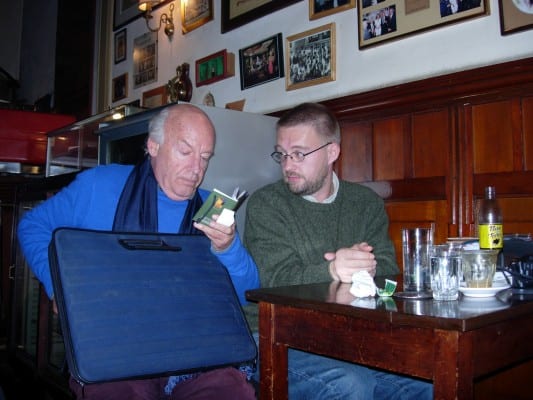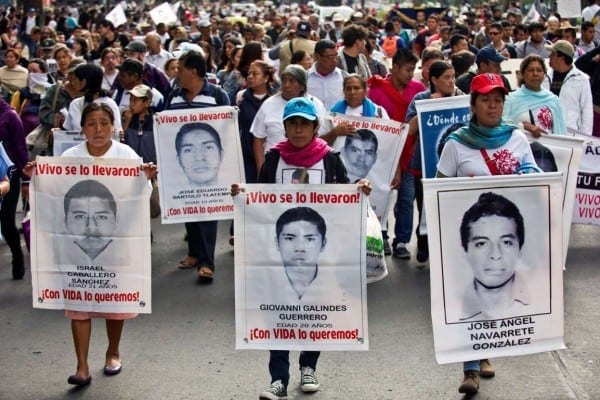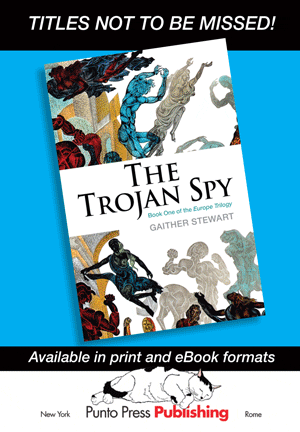“It’s worthwhile to die for things without which it’s not worthwhile to live.” Eduardo Galeano
[dropcap]E[/dropcap]duardo Galeano passed away. For several days I did not know. I was in India, in divided Punjab, working. Then, someone wrote me an email, informing me that my friend, one of the greatest people I’ve ever met in this world, is no more.
My first reaction was of absolute panic. “Does it mean that the revolution is over?” I thought. I was exhausted, overworked, I could not think straight. I was leaving India, my plane to Doha was boarding. I was traveling all the way to Beirut.
After resting for several minutes in my seat, I realized how severe my pain was but how irrational my fear.
Eduardo Galeano was no more. To me, as to so many others, he was one of the most powerful symbols of Latin American humanism and its Revolutions. The first wave of the revolutions, represented by Fidel, Che, and Salvador Allende, formed him, made him what he was. Then, his great voice of justice, poetry, fairytales and dreams shaped the second wave, which during the last two decades swept through Venezuela, Ecuador, Bolivia, and several other Latin American countries.
All great Latin American revolutionaries from the 1990s until now are dreamers, and they grew up on the books of Eduardo Galeano, on his Las venas abiertas de América Latina (Open Veins of Latin America), and on the monumental trilogy often described as “the most powerful literary indictment of colonialism in the Americas” – Memoria del fuego (Memory of Fire).
I grew up on his books as a child. His work had a tremendous influence on me, convincing me to become an internationalist, and later an anti-imperialist fighter.
I am certain that Hugo Chavez would not have decided to lead his men against the degenerate pro-Western regime in Caracas, if he had not been inspired by Open Veins of Latin America, if he had not been outraged by the powerful examples this book provided of the ravishment and plundering of his beloved continent by Spanish colonialists and, later, by North American supremacists.
Evo Morales and Rafael Vicente Correa would have never felt such a strong moral mandate to act and to defend both the indigenous and the poor people in their countries, if they would not have sensed the horrible weight of the more than 500-year rape of their continent, so meticulously, vigorously, and beautifully described in Memory of Fire.
Galeano’s work has been, for decades, a powerful symbol of defiance against North American imperialism. Chavez gave Open Veins of Latin America to Obama, in Trinidad and Tobago, at the 17 April 2009 opening session of the 5th Summit of the Americas. (To much derision by the Western presstitutes.—Eds) A year earlier, Galeano himself commented on Obama’s election: “The White House will be Barack Obama’s house for a while, but this White House was built by black slaves. And I’d like, I hope, that he never, never forgets this”.
In Latin America, Eduardo Galeano was revered as a giant of letters, as a symbol of rebellion, of revolution, and of the fight for justice.
“La Lucha Continua!”
That is why, subconsciously, I was overwhelmed by fear after learning of Eduardo Galeano’s death: fear that something great and important had just ended, and would not be able to go on.
But soon I calmed down a little: my friend, a man, a wonderful human being, Eduardo Galeano, is no more. But the revolution, which he helped to ignite, will go on, until the final victory!
***
“Utopia is on the horizon,” Galeano once wrote. “I move two steps closer; it moves two steps further away. I walk another ten steps and the horizon runs ten steps further away. As much as I may walk, I’ll never reach it. So what’s the point of utopia? The point is this: to keep walking.”
Galeano told me that he was in love with two ladies, both splendid, both fragile, both tremendously desirable. One was called Utopia, the other, Reality.
Both are dangerous to the masters of the world, to Empire, because one gathers dreams, including dreams for a better world, while the other one bravely tells the truth.
We were sitting in old Cafe Brasilero in Montevideo, when he suddenly declared:
“I am a hunter of stories; I listen to the stories, then I give this back to the people after putting the stories through a creative process. My position is always that in order to not be mute, one should not be deaf. One has to be able to listen in order to speak. I am a passionate listener. I listen to reality. Reality is a magic lady, sometimes very mysterious. To me she is very passionate. She is real, not only when she is awake, walking down the streets, but also at night when she is dreaming or when she is having nightmares. When I am writing, I am always paying tribute to her – to that lady called Reality. I am trying not to fail her.”
Utopia, Quixotism, poetry – these are essential materials from which every great revolution is made.
Reality is absolutely essential, too.
Galeano flew deep into the past of his continent, and he visualized a great future for his people. He imagined and dreamed, insulting injustice, demanding the impossible.
[dropcap]T[/dropcap]here were days when he chose to totally divorce himself from reality, at least for a time: “I am working every night, on a book, together with my great friend, a Mexican painter … who lived 150 years ago. We are having very meaningful conversations…”
There were days when he would answer every question I asked with a story, a fairytale:
“Are the veins of Latin America still open, Eduardo?”
He smiled at me, paused for a few seconds, then answered:
Yes … obviously yes. I think they are. Not long ago I met count Dracula in Buenos Aires. He was looking for an Argentinean psychoanalyst. Argentina produces many psychoanalysts. Someone told Dracula that an Argentinean psychoanalyst could still cure him. I found count Dracula in a terrible state, really depressed, thin, terrible…”
I played the game: “There is plenty of competition around, isn’t there?”
“Exactly. Dracula was suffering from a tremendous inferiority complex, seeing how the great corporations of the modern world behave. So he was walking through the streets, searching for someone to cure him.”
I wondered: “But a vampire like him, in this world he probably has many friends, not only competitors…”
Galeano insisted: “He saw them all as competition. And he told me that nothing made much sense anymore. Seeing how the world behaved, nothing made sense to him.”
While Galeano was talking about his encounter with Dracula, we drank coffee and water and I forget what else. Cafe Brasileiro is the oldest cafe in Montevideo, founded in 1877, and of course, it was “his cafe”. Galeano claimed that it was haunted, a bit like Cafe Tortoni in Buenos Aires. I read somewhere that they closed it down several years ago, but now as I search for it online, it is still there. Maybe another fairytale from Montevideo?

Galeano reading to the author at the Café Brasileiro. (Photos by the author. Click to expand.)
Every time we met there, I felt guilty. There were dozens of men and women, most of them very young, trying to steal at least a few seconds of Eduardo’s time: to get an autograph, or to ask that “one significant, essential question”. Boys would beg for an inscription so that they could present a signed book to their beloved: “Please put down ‘for Laurita’, Magda, Daniela…”
I had several engagements in Montevideo: showing my documentary about the 1965 coup in Indonesia at the legendary Cinemateca Uruguaya, and delivering speeches, or were they lectures, at the Film School.
But we kept meeting, mostly discussing what was most important for both of us – the future of Latin America and its revolution.
By then, Eduardo had inspired hundreds of millions, but he was not aspiring to lead.
With great admiration I realized that now his goal was much more humble but equally important: to make sure that the new Latin American leaders would fulfill their promises and not betray the people.
Yes, changes were on the horizon, they were happening as we spoke. Almost all of Latin America was getting up from its knees. But the historic, economic, and social context was still terrible. So much work had to be done:
“I would say that now the tendency is to vote in progressive governments that are trying to change things. This means a tremendous challenge but also a tremendous responsibility, because these new progressive governments that can be found in several countries of Latin America are carriers of collective hope which was not dead but seriously wounded, in terrible shape. Latin America is part of the world, which was for many years condemned to the system of power where intimidation had more strength than the vote. It began in 1954 – more than half a century ago – when the democratically elected government of Guatemala attempted to make agrarian reforms, to return dignity to indigenous people. All that was later destroyed by foreign invasion. And then it continued: invasions and coups against any positive changes – progressive or nationalistic – concerning natural resources, independence, national dignity… Governments that intended to implement changes were destroyed. It happened in Brazil, Dominican Republic, Bolivia, in Chile, which became the most famous case because Salvador Allende was converted to an international symbol. Then the Sandinistas in Nicaragua, again the same thing – they were destroyed after ten years of war because they intended to create a country – fatherland – where there was only a colony before. So all this is a very long story, a story of frustrations, failures, of hope washed in blood. All this created the situation in which we are now. How can I explain it? Change is possible, but to implement the change, one has to fight against not only the painful and fucked up experiences of the last half century but also against the long betrayal and something that I call “the culture of impotence”. It is a culture that has roots in the colonial period, in the period when the continent was controlled by Spain and Portugal and that was later broken up and consolidated by the military dictatorships and the fatalistic brothers of the church. All this helped to create a culture of impotence that manages to paralyze people with fear. It tells you that reality is untouchable, reality can’t be touched, can’t be changed. These days this culture of fear has a spokesman who is a universal god – the god of the market, a gangrenous figure. He is checking on us from above and tells us what we can do and what we can’t.”
One evening he spoke about Hope:
“People here want very basic things. They still can’t find the answers or solutions to their very simple demands like dignity, peace, and work. People are searching but they are not finding solutions. They are walking and searching on different roads. They are being betrayed – we have a long tradition of betrayal here. And they are now, generally and to a certain point, thinking that these new governments, which have lately appeared in several parts of South America, will act more or less in accordance with the hope that they managed to evoke. That’s why I always say: careful, one doesn’t play with people’s hope. Hope is very fragile. If the people deposited this hope in your hands, comrades – be very careful! Don’t betray this hope. Because hope can’t be recovered easily! When it is lost, it takes a long time to bring it back. New progressive governments in South America are facing tremendous historic responsibility. One writer and journalist who had a profound influence on me kept repeating: one sin, which can’t be forgiven, is a sin against hope. Everything can be forgiven, but not this. That’s why progressive governments have to be extremely careful not to destroy hope.”
It was a difficult, very difficult time. And Eduardo Galeano, the great Marxist, an enormous left-wing thinker and Revolutionary, stood by the people during that period, and not by the politicians and leaders. Because people are what really matter – Revolution is conducted for them, to serve them, not the other way around!
I understood it then, but I think that I understand it now, several years later, much better.
And the Latin American leaders and revolutionaries listened and understood, too. It was extremely challenging for some of them. Especially in Brazil, Chile and Argentina, where right-wing media and oligarchs and neoliberals were fighting for every inch of territory. But with some very few exceptions, nobody betrayed! Hope was not killed. Hope is still there, bigger and bigger, tremendous. And Eduardo Galeano and a few others are to be thanked for that.
***
And there is one more tremendous thing related to Eduardo that I will remember for as long as I live:
I shared with him my fear that without armed struggle against imperialism, no victory can, most likely, be achieved.
He did not say yes or no. He thought for a while, then drilled me with his eyes:
“You and I are educated and we know the world. We are in many ways what they call the leaders. And leaders must serve their people. No matter how tough our lives are, we are not victims. Those who are suffering are the robbed, poor, uneducated people. They have to decide whether and when to take up arms and go: they, not we. If and when they decide to fight, we have to obey and lead them. Whether they will fight or not is not up to us to decide.”
Galeano died. My eyes are full of tears. Personally, I feel devastated. But Revolution is spreading all over the world and that is what matters. Thanks to him, and to others like him, fewer and fewer people will betray the cause. And more and more will dream and fight for the survival of our Planet, more and more will “keep walking”!
ABOUT THE AUTHOR
[box] Roaming correspondent Andre Vltchek is a philosopher, novelist, filmmaker and investigative journalist. He has covered wars and conflicts in dozens of countries. His latest books are: “Exposing Lies Of The Empire” and “Fighting Against Western Imperialism”. Discussion with Noam Chomsky: On Western Terrorism.
Point of No Return is his critically acclaimed political novel. Oceania – a book on Western imperialism in the South Pacific. His provocative book about Indonesia: “Indonesia – The Archipelago of Fear”. Andre is making films for teleSUR and Press TV. After living for many years in Latin America and Oceania, Vltchek presently resides and works in East Asia and the Middle East. He can be reached through his website or his Twitter, or directly through TGP at andre.vltchek@greanvillepost.com [/box]

![]()



